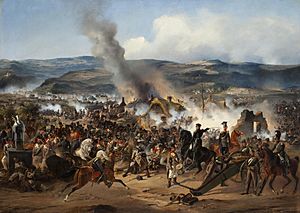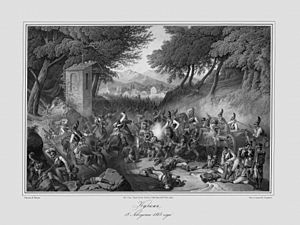Battle of Kulm facts for kids
The Battle of Kulm was an important fight during the War of the Sixth Coalition. It happened on August 29-30, 1813, near the town of Kulm (now called Chlumec) and the village of Přestanov in northern Bohemia.
A French army group, led by General Dominique Vandamme, attacked a Russian army group on August 29. This Russian group was led by General Alexander Ivanovich Ostermann-Tolstoy. The next day, a Prussian army group, led by Friedrich von Kleist, surprised Vandamme's forces from behind. At the same time, more Russian and Austrian soldiers attacked the French from the front and left.
General Vandamme's army was defeated. They lost many soldiers and cannons. This battle was a big win for the Coalition forces.
Quick facts for kids Battle of Kulm |
|||||||
|---|---|---|---|---|---|---|---|
| Part of the German campaign of the Sixth Coalition | |||||||
 Painting by Alexander Kotzebue |
|||||||
|
|||||||
| Belligerents | |||||||
| Commanders and leaders | |||||||
|
|||||||
| Strength | |||||||
| 32,000–37,000 | 15,000–16,000 initially 103,000 totally |
||||||
| Casualties and losses | |||||||
| ~17,000 Details: 9,000 killed or wounded; 8,000 captured; 81 guns; 2 Imperial Eagles; 2 guidons. |
~12,000 Details: 11,000 killed or wounded; 1,000 captured. |
||||||
Contents
What Led to the Battle?
After the French won the Battle of Dresden, General Vandamme chased the defeated Allied armies. Napoleon sent other generals, Saint Cyr and Auguste Marmont, to help Vandamme. Vandamme's army was in front, with the other French armies behind him.
Vandamme soon caught up with General Ostermann-Tolstoy's Russian forces. This happened near Kulm, which is about eight kilometers northwest of Ústí nad Labem (a city in the Czech Republic today).
The Battle Unfolds
On August 29, Vandamme had about 34,000 soldiers and 84 cannons. He attacked the Russian soldiers, who were protecting the main Allied army as it retreated. The Russian force was smaller, with about 14,700 to 16,000 soldiers.
This was a very risky situation for the Allies. If Vandamme won, the French could take control of the mountain passes. This would trap the retreating Allied army, allowing Napoleon to capture them.
However, General Ostermann-Tolstoy bravely gathered his troops for a strong defense. He was badly hurt during the fighting and lost his left hand. But General Yermolov quickly took over command. By the end of the day, the Allies had grown to 20,000 men.
Vandamme's attacks were all stopped. His situation became even worse the next day. A Prussian army group, led by General Kleist, attacked Vandamme's army from behind. Then, Russian and Austrian forces, led by Generals Mikhail Barclay de Tolly and von Colloredo-Mansfeld, attacked the French from the front.
Vandamme tried to fight off attacks from both sides. He ordered his soldiers to form defensive squares. But the French troops were not experienced enough. They could not hold back the Allied attacks. Soon, they had to retreat from the battlefield. They suffered heavy losses, and General Vandamme himself was captured.
Who Lost What?
The French army lost a lot in this battle. Out of 34,000 soldiers, between 13,000 and 25,000 were lost. This included Vandamme being captured. They also lost almost all their cannons, 82 out of 84.
The Allied forces also had losses, but fewer. They lost about 11,000 soldiers who were either killed or wounded.
Two Polish cavalry groups, called Uhlans, were part of Vandamme's army. One group had to surrender after being trapped. The other group managed to escape safely.
What Happened Next?
This victory at Kulm was very important for the Allies. It happened around the same time that another French general, MacDonald, lost a battle at Katzbach. Even though Napoleon had won at Dresden, the Allied success at Kulm stopped him from completely crushing his enemies.
By winning this battle, General Ostermann-Tolstoy and his troops bought valuable time. This allowed the Allied armies to regroup after the Battle of Dresden. They then prepared for the Battle of Wartenburg and later the much larger Battle of Leipzig.
The Battlefield Today
Today, much of the old battlefield has buildings on it. There is a large monument with a lion on top near the Hotel Napoleon.
 | Jessica Watkins |
 | Robert Henry Lawrence Jr. |
 | Mae Jemison |
 | Sian Proctor |
 | Guion Bluford |


